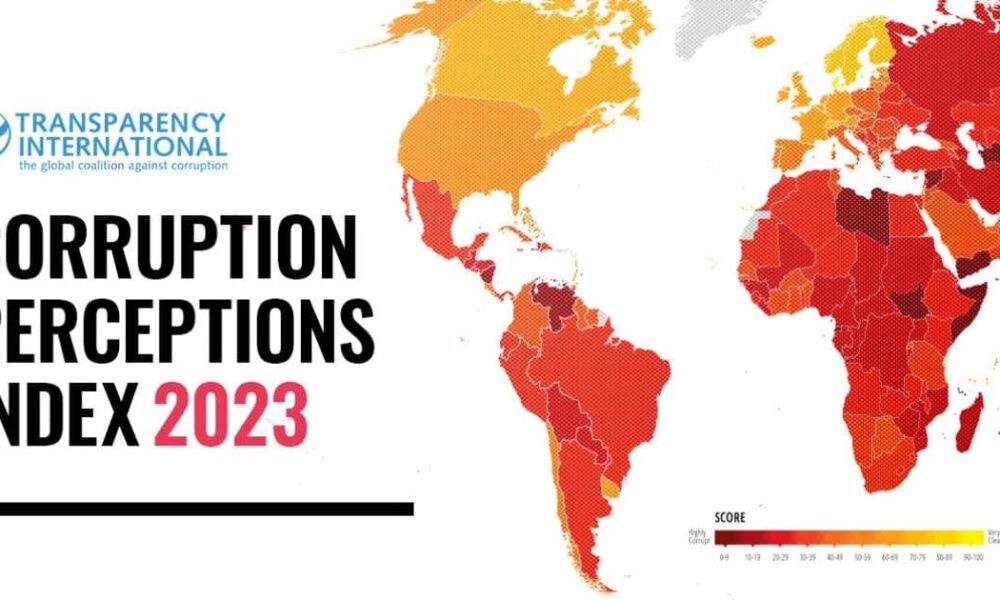By William Madouk
Exactly thirteen years since independence, South Sudan has maintained upper position of the most corrupt countries in the global classification.
According to Transparency International (TI) reports, the Corruption Perception Index (CPI) 2023, the youngest nation remains on position 177, the second most corrupt, alongside Syria and Venezuela, after war-torn Somalia, at peak.
The CPI report seen by No. 1 Citizen Daily Newspaper, awards South Sudan with 13 points, while Somalia emerged as the number one most corrupt country in the world with 11 points at 180th position.
Denmark has been named in the investigative report as the least corrupt country globally with 90, followed by Finland with 87 and New Zealand with 85 points respectively.
However, in an interview with No. 1 Citizen Daily Newspaper, on phone, the National Minister of Information minister, Michael Makuei outrightly downplayed the report.
“They who did their evaluation, who evaluated them in terms of corruption? And who gives them that right to evaluate others?” Makuei fumed while questioning the source of the report.
The government spokesperson termed the report as a “politically motivated” fabrication meant to tarnish the image of the country.
“Of course, these are politically motivated reports, and I cannot consider them to be real reports,” he added.
Although Makuei admitted the existence of corruption worldwide, he disputed the TI classification, placing the youngest East African nation at top of the list of corrupt nations.
“One day, I was asked by one of the journalists who said South Sudan is reported to be corrupt—is South Sudan corrupt? And I said I cannot say South Sudan is not corrupt because it’s part of the world,” he recalled.
“There is no country in this world that can claim that we are not corrupt, but it is the level of corruption that matters,” he continued.
Besides, Makuei questioned Transparency International’s illegibility and the mechanisms applied to come up with the said result.
“If they are writing that South Sudan is among the most corrupt, and it is number two in terms of corruption, then what was the criteria that they used for the evaluation?” he wondered.
“These are politically motivated reports so that they tarnish the image of any country when they see it as progressing,” Makuei echoed.
Minister Makuei, who doubts the fairness of TI and the source of funding, cited that the person who provides money has the final say on when and how things should be done, meaning they influence the report.
“Those who write these reports, who evaluate them? So that we prove them to be angels who are not corrupt, and then we give them the right to evaluate others. Who is funding this organization? He who pays the piper calls the tune,” he argued.
Based on the TI countries scoring on a scale of zero (0) (highly corrupt) to 100 (very clean),.
Yearly, the CPI ranks 180 countries and territories around the globe by their perceived levels of public sector corruption.
The report implies that both authoritarian and democratic leaders are undermining justice, adding that this increases impunity for corruption and even encourages it by eliminating penalties for criminals.
Mr. François Valérian, the chair of TI, said, “Corruption will continue to thrive until justice systems can punish wrongdoing and keep governments in check. When justice is bought or politically interfered with, it is the people that suffer.”
“Leaders should fully invest in and guarantee the independence of institutions that uphold the law and tackle corruption. It is time to end impunity for corruption,” he added.
Among other African nations, Equatorial Guinea is in third place, trailed by Libya, while Sudan is in fifth place, followed by Burundi, Comoros, Chad, the DR Congo, and Eritrea in tenth place.
According to the TI report, over two-thirds of countries score below 50 out of 100, which strongly indicates that they have serious corruption problems.
Meanwhile, the global average is stuck at only 43, the vast majority of countries have made no progress or declined in the last decade. What is more, 23 countries fell to their lowest scores to date this year.
Transparency International is a global movement working in over 100 countries to end the injustice of corruption. It is an independent, non-governmental, not-for-profit organisation that works with like-minded partners across the world to end the injustice of corruption.




